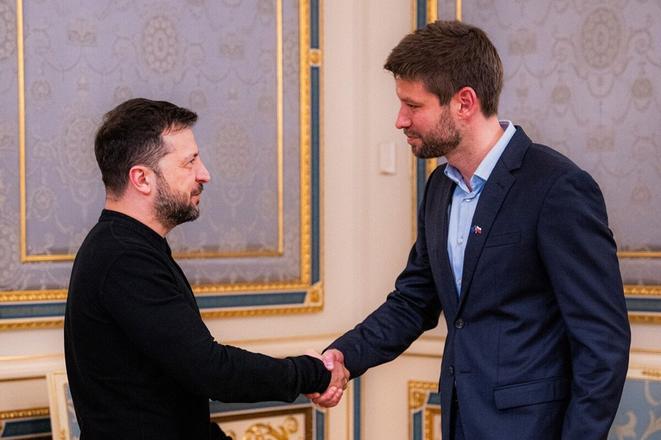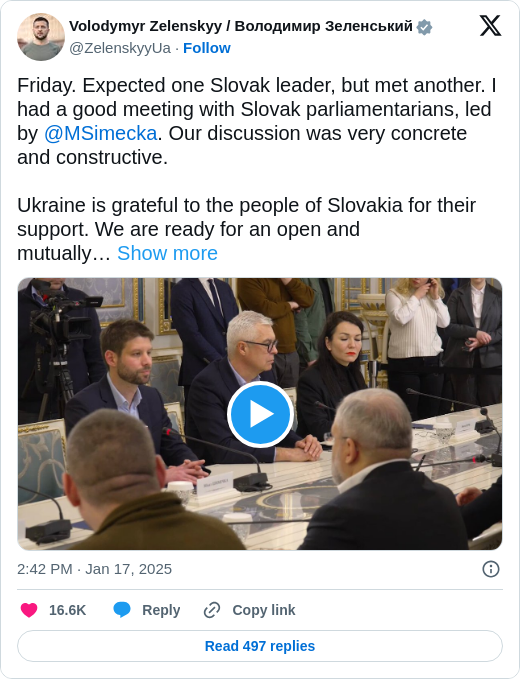Welcome to your weekly commentary and overview of news from Slovakia. When Fico ignored an invitation from Zelensky to visit him in Kyiv, Šimečka showed up instead. Fico and Gašpar say they want to leave the option open for Slovakia to leave the EU and NATO. A school stabbing attack cost two lives, and shook Slovakia.
If you have a suggestion on how to make this overview better, let me know at michaela.terenzani@spectator.sk.
Šimečka in Kyiv, Fico and Gašpar still (mentally) in Moscow
Robert Fico may have shaken hands with Putin and a bunch of coalition MPs may have taken a trip to Moscow, but many, if not most, in Slovakia still know how to read their geopolitical compass. That is a message from two pieces of news from the last week.
The opposition leader’s appearance in Moscow is one of them. The ping-pong of increasingly tense public comments about the reasons why Russian gas has stopped flowing to Slovakia through Ukraine prompted Ukrainian President Volodymyr Zelensky to tell Fico to “come to Kyiv on Friday”. The Slovak prime minister refused.
One reason was that, supposedly, it wasn’t safe for him in Kyiv – which is intriguing because, firstly, Fico has previously claimed that there is no war in Kyiv and that people there live “normal” lives; secondly, it seems to have been safe enough for the British prime minister, the German foreign minister and the Italian defence minister each to make their own visits to Kyiv in the past week. Fico said he wanted to meet Zelensky in Davos, Switzerland, next week – which is welcome for practical reasons, but displays clear symbolic weakness.
But Zelensky did get to talk to a Slovak political leader in person on Friday in Kyiv, after all. Progressive Slovakia leader and MP Michal Šimečka came to visit, along with several other PS politicians including Slovakia’s former ambassador to NATO Tomáš Valášek and former foreign minister Ivan Korčok. In a statement on Friday night, Fico said their visit meant they “blindly and uncritically stand on the Ukrainian side” and reiterated his claim that, if they were in power, his opponents would sent Slovak troops to fight against Russia in Ukraine – which was one of the falsehoods that helped coalition candidate Peter Pellegrini win the presidential election.
The photo of Šimečka shaking hands with Zelensky could be viewed as a daring stunt by the opposition, which earned the PS leader much applause among those who want Slovakia to support Ukraine in its war against the Russian aggressor and to be part of the West. Not all of them count themselves PS supporters, even though PS is currently polling above 20 percent.
But as things stand now, that picture is also important for the country, because it reminds its allies that the prime minister’s handshake with Putin does not represent the whole of Slovakia.
The other piece of news is that dozens of Slovakia’s most senior diplomats have openly declared that the government is destroying the country’s foreign policy consensus. No, this is not news of some revolution at the Foreign Affairs Ministry, which is currently led by Fico loyalist Juraj Blanár, a former regional governor who had no experience of foreign policy before he was catapulted into the top job in October 2023.


 Michal Simecka and Volodymyr Zelenskyj met in Kyiv (source: Michal Šimečka • Progresívne Slovensko/FB)
Michal Simecka and Volodymyr Zelenskyj met in Kyiv (source: Michal Šimečka • Progresívne Slovensko/FB)
